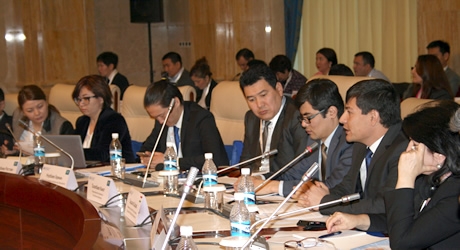Freedom from Torture
Civil Society Coalition against Torture and impunity in Tajikistan

Navigating the United Nations human rights system can be a challenge, particularly for countries that are relatively new to the process.
This has been the case in central Asia, where most countries have ratified the majority of the core human rights treaties. In doing so, these countries have committed to report to various UN committees that monitor treaty obligations. In addition they have welcomed visits by special rapporteurs on specific subject areas, and undergone the Universal Periodic Review, which reviews the human rights compliance of every single country around the world.
As a result, these countries have received “hundreds of recommendations from various UN human rights mechanisms,” said Elisabeth da Costa, Regional Representative a.i. for the UN Human Rights Office for Central Asia.
To help these countries find the best path through the forest of recommendations and principles associated with implementing human rights laws, the UN Human Rights Office organized a regional conference in Bishkek, Kyrgyzstan. Government representatives from Kazakhstan, Tajikistan, and the Kyrgyz Republic, along with members of NGOs (also from Turkmenistan) discussed best practices from various countries on the establishment of national human rights mechanisms for reporting and following up on UN human recommendations, the development of national human rights action plans and databases.
“Only through the development of a national human rights action plan can Governments comprehend the huge number of recommendations and ensure a holistic implementation,” said da Costa. “The process of developing such plan is as important as the outcome. To be meaningful it needs to involve all relevant stakeholders.”
Attendees also learned about human rights indicators, which provide concrete, practical tools for enforcing human rights and measuring their implementation. Virgínia Brás Gomes, a member of the Committee on Economic, Social, and Cultural Rights showed the audience how to adapt indicators for their countries as well explained why it was important to have them.
“If you don’t count, it won’t matter,” she said. “When we speak about human rights indicators we mean the Government’s efforts to comply with their human rights obligations and the impact of these efforts on rights holders.”
Although all countries should have these bodies established, they do not have to be alike, said Sharaf Karimzoda, Deputy Head of the Directorate for Human Rights Guarantees of the Executive Apparatus of the President of Tajikistan.
“It is much more important that they are functionally effective and efficient within their own national context,” he said.
Other participants agreed. Gulmira Kudaiberdieva, Deputy Prime Minister of the Kyrgyz Republic noted that the cooperation between her government and the human rights mechanism had become more organized with the established of a national Coordination Human Rights Council, while Usen Suleimen, Ambassador-at-large of the Ministry of Foreign Affairs for the Republic of Kazakhstan said there was a trend of increased dialogue between governments and the civil sector across the region.